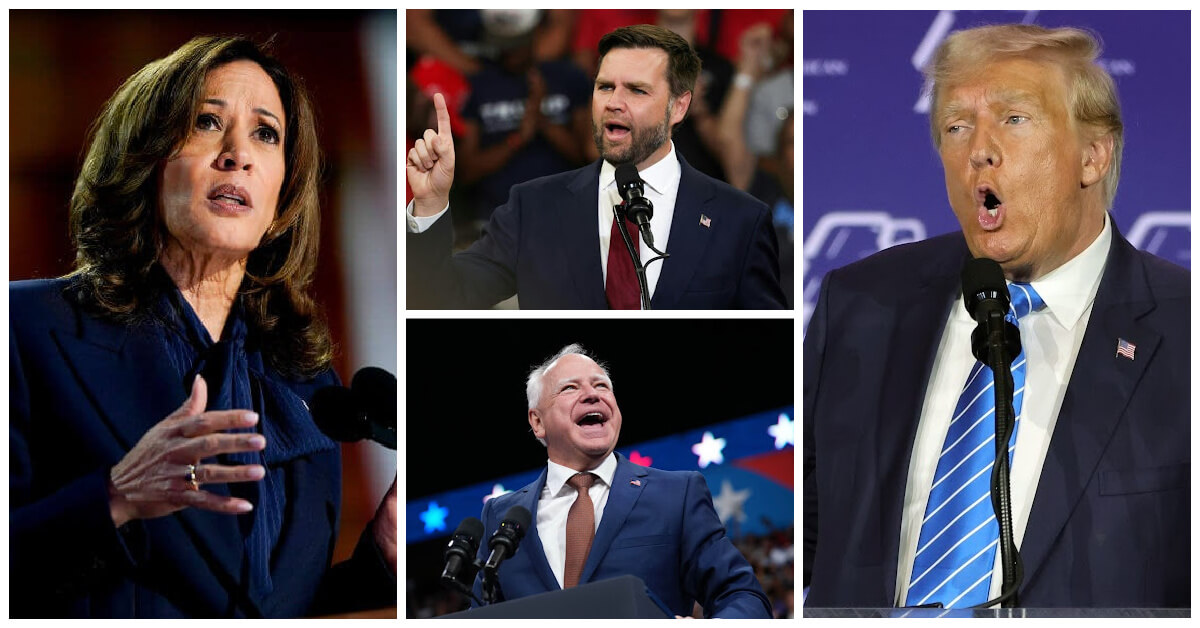Harris spoke more extensively about war in Gaza at DNC than Trump did at RNC
Republican candidates did not use the worlds “Gaza,” “Hamas” or “Palestinians” during their acceptance speeches

Clockwise from left: Vice President Kamala Harris, Sen. JD Vance, former President Donald Trump and Gov. Tim Walz. Photo by Getty Images
In the 71 days until the election, many American Jews will be watching to see whether and how political candidates from both parties talk about Israel, Hamas, and the war in Gaza. Data gathered from The New York Times (here and here) along with C-SPAN video and transcripts show how often and in what context those topics were discussed at the Democratic and Republican conventions this summer.
Former President Donald Trump said the word Israel once during his acceptable speech, and also spoke about the hostages being held by Hamas. Neither he nor his running mate, Sen. JD Vance of Ohio, mentioned “Gaza,” “Hamas” or the “Palestinians” from the podium in Milwaukee. On the Democratic side, Vice President Kamala Harris spoke for nearly two minutes about the war, using the word “Israel” four times, “Gaza” three and “Hamas” and “Palestinian” one time each. Gov. Tim Walz of Minnesota, the Democratic nominee for vice president, was silent on the matter.
At the Democratic National Convention
Here’s a rundown of speeches by Harris, Walz and President Joe Biden:
- Palestinian: Biden and Harris each said the word “Palestinian” once, Harris in this key sentence: “President Biden and I are working to end this war, such that Israel is secure, the hostages are released, the suffering in Gaza ends and the Palestinian people can realize their right to dignity, security, freedom and self-determination.”
- Hostages: Biden mentioned them twice, as did Harris: once in the sentence above, and here: “With respect to the war in Gaza, President Biden and I are working around the clock, because now is the time to get a hostage deal and a cease-fire deal done.”
- Gaza: Both Biden and Harris said the word three times each.
- Hamas: Only Harris mentioned by name the terrorist organization responsible for the Oct. 7 attacks.
- Israel: Harris mentioned the Jewish state four times.
Additional mentions of the Palestinians at the DNC came from Sen. Raphael Warnock of Georgia, who said:
I need my neighbor’s children to be OK so that my children will be OK. I need all of my neighbor’s children to be OK. Poor inner city children in Atlanta and poor children of Appalachia. I need the poor children of Israel and the poor children of Gaza. I need Israelis and Palestinians. I need those in the Congo. Those in Haiti. Those in Ukraine. I need American children on both sides of the track to be OK. Because we are God’s children.
And from Rabbi Sharon Brous, who gave the invocation on the convention’s second night:
This story counters extremism with capaciousness and compassion. It rejects the inevitability of war, affirming that every one of us — Muslim and Jew, Christian, Black, white, Latino, AAPI, queer and straight, Israeli and Palestinian — deserves to live in dignity and in peace.
Two mentions also came in the benediction from the Rev. William Hall, a Chicago alderman, on the third night:
Hatred is a misunderstanding of love. Help us to come together and paint a brighter future. The one that Shirley Chisholm dreamt of, Maya Angelou spoke of. And let there be peace tonight. Peace in Palestine. Peace for Palestinians. Peace for Israelis. When we come together, we win.
At the Republican National Convention
Here’s a rundown from the two speakers at the top of the party, Trump and Vance:
- Israel: Trump said it once: “I will end every single international crisis that the current administration has created … And the war caused by the attack on Israel, which would never have happened if I was president.”
- Hostages: Trump mentioned it in this sentence: “And to the entire world, I tell you this, we want our hostages back — and they better be back before I assume office, or you will be paying a very big price.”
- Gaza, Hamas, Palestinians: Neither of them uttered these words.
Additional mentions at the RNC came from David Sacks, a tech entrepreneur and major Republican donor:
And the administration’s policy towards Gaza has been so incoherent that the only thing that pro-Israel and pro-Palestine protesters agree on is the chant ‘F Joe Biden.’
There was also one reference in a montage of right-wing media clips about students at the University of North Carolina:
God bless those USC frat guys for taking down the Palestinian flag and putting up Old Glory.
More context
The scant mentions of the war may reflect where it ranks among concerns for U.S. voters. Only 1% of registered voters say the Middle East/Israel/Palestinians is the most important issue in deciding their vote this November, according to an August poll from The Times and Siena College. According to recent data by YouGov, the top issues for most voters are abortion, immigration and inflation.
In the critical swing state of Michigan, the state with the largest Arab American population, less than 1% named the Middle East conflict as their top issue. During the primary, when Biden was still in the race, a group calling itself the “Uncommitted” movement mounted a challenge to the president, garnering more than 100,000 votes. Biden won Michigan in 2020 by roughly 244,000 votes.
“Any effort to deflect or divert Democratic support from President Biden in this election is effectively a vote for Donald Trump,” Halie Soifer, the CEO of the Jewish Democratic Council of America, said at the time.













